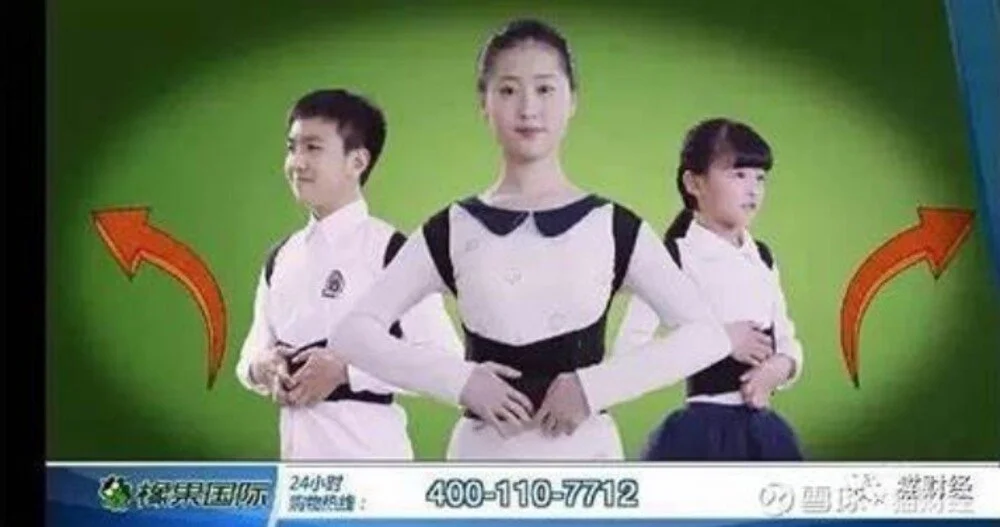Babaka makes a comeback: is posture correction brace a 'stupid tax'?
People born in the '90s might not have worn Babaka as kids, but now they're eagerly embracing this 'beauty contraption.' Babaka, a posture-correcting brace, has gone viral, selling ¥100 million ($13.8 million) on Douyin livestreams in just 90 days!
Babaka ads have been everywhere on social media lately. People wear it to work and pair it with their daily outfits, but no one wears it to do homework like they used to do in the '90s. Babaka's hero product enjoyed a total sales of over 837,000 units on Douyin, and more than 300,000 on Tmall for the past 365 days. Babaka's sales on Douyin reached over ¥250 million ($34.5 million) from January to April 2024, a 417% month-on-month increase according to Chanmofang.
Babaka's best sellers on Douyin (left) and on Tmall (right) both priced at ¥199 ($27.5).
Young people wear Babaka at work. Images; Xiaohongshu
Why Babaka resurged after years of silence
For many people born in 90s, Babaka is a 'childhood memory,' frequently advertised on TV shopping channels with commercials showing teenagers standing tall and straight after using it. However, Babaka eventually faded from the public.
Babaka's TV commercial in 1990s.
In 2021, Cofoe Medical (可孚医疗) acquired Babaka's insolvent parent company. Babaka revised its target audience from teenagers to young women, catering to the high demand for 'posture correction' and 'enhanced poise.' According to Chanmofang, over 80% of Babaka's consumers on Douyin are women, with those aged 24 to 40 making up 80%.
Babaka began a new chapter by sponsoring a variety show as its first step. At the end of 2022, Babaka sponsored the second season of the variety show 'Go for Happiness,' which received a rating of over 9.5 out of 10 and amassed more than 1 billion views. The product placement in this show successfully embedded the catchy tagline 'Wear Babaka, joy's not far (穿上背背佳, 快乐再出发)' in viewers' minds like a magic spell. Babaka capitalised on this collaboration to increase brand awareness, specifically targeting the young female audience with strong spending power.
Babaka's product placement in the variety show 'Go for Happiness.'
The real turnaround happened at the end of 2023 when a photo of celebrity Bai Lu (白鹿) wearing Babaka went viral on Weibo, garnering over 190 million views under the hashtag #BaiLuWearingBabaka. Babaka leveraged this trend by promoting the 'Bai Lu star-style' Babaka, boosting brand visibility. On May 2nd, 2024, Babaka officially announced Bai Lu as the brand spokesperson to further promote the 'Bai Lu star-style,' significantly amplifying the celebrity effect.
Bai Lu, the brand spokesperson, wearing Babaka. Images: Weibo, Tmall
Besides of star-style effect, Babaka's resurgence is attributed to content marketing on Douyin and Little Red Book. There are over 40,000 posts about Babaka and over 6,700 posts relevant to Babaka products on Little Red Book. On Douyin, the topic #Babaka has amassed over 700 million views. Babaka's content seeding targets consumers looking to shape their bodies and improve posture.
Babaka showcaes the constrasting effect of wearing Babaka before and after, emphasizing that it visually slims by 10 kg. Images: Babaka's post on Little Red Book.
Recognizing that focusing solely on 'posture correction' isn't enough, Babaka even goes further to present itself as a beauty tool. Recently, Babaka collaborated with a KOL with over 13.67 million follwers on Douyin who showcased a slim waist and attractive curves when wearing Babaka in a transformation video. While it's uncertain if this will appeal to the female audience on Douyin, male users are likely to be interested.
Babaka x Douyin KOL collab for a transformation video. Images: Douyin
According to Chanmofang, in the first quarter of 2024, Babaka collaborated with over 7,000 Douyin accounts focusing on fashion, home, food, and celebrity gossip. These collaborations with lower and mid-tier influencers generated 52% of Babaka's exposure and 56% of its interactions. This led to over ¥75 million ($10.4m) in sales, accounting for about 42% of Babaka's total sales through Douyin.
Is posture correction brace a 'stupid tax'?
The Chinese body shaping market has shown continuous growth over the past five years, indicating significant potential. It's estimated to reach a trillion-RMB ($138 billion) market this year. Babaka's popularity is closely linked to this industry's development. In addition to posture correction belts, a yoga body stick that claims to 'straighten the body in just 10 minutes a day' has been selling well. The best-selling SKU, priced at ¥9.9 ($1.37), has sold over 500,000 units.
The best sellers of yoga body sticks, claiming to 'straighten the body in just 10 minutes a day' on Douyin.
However, the debate over whether these products are 'stupid tax' continues. Discussions on Xiaohongshu include topics like 'the harm of Babaka' and 'whether Babaka is genuinely effective.' 'Stupid tax' is frequently used in negative comments, not just for Babaka but for the entire posture correction category.
Monitoring negative comments about Babaka from Chanmofang, especially those referring to 'the stupid tax paid for Babaka.' Other major bad comments include 'uncomfortable', 'tight', and 'not good to use.'
When Cofoe Medical acquired Babaka, they intended to position it as a sub-brand specializing in rehabilitation aids. Their plan was to partner with university medical schools, major top-tier hospitals, and other medical institutions to conduct clinical academic research and enhance trustworthy endorsement for Babaka. However, on Babaka's Tmall flagship store, the product details for the best-selling items only highlight the brand's 27 years of experience in posture correction and its top sales ranking in the category. While the page includes patent certifications and safety inspection reports, it lacks efficacy test reports and endorsements from authoritative institutions.
Babaka's product details for patent certification and safety inspection. Images: Babaka's Tmall flagship store
Wrapping up
Babaka cleverly taps into nostalgic childhood memories and, more importantly, the desire for effortless, good-looking posture and body shape. Relying solely on the celebrity effect, KOL marketing, and content seeding is not enough to sustain long-term development. It's crucial to change consumers' perception of posture-correction products as a 'stupid tax' in order to build trust and credibility.








































